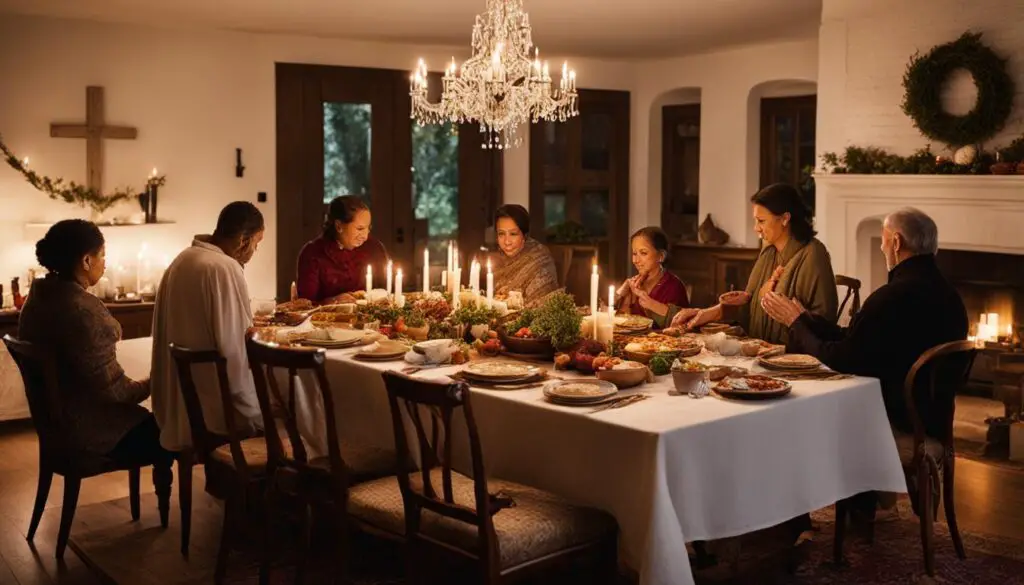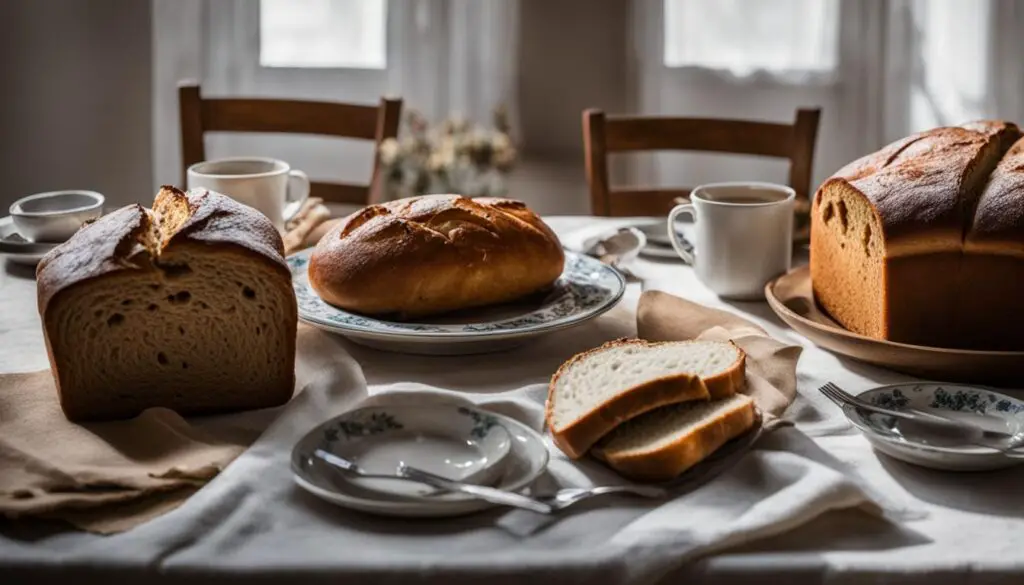Saying grace before a meal is a longstanding tradition that allows individuals to express gratitude and connect with a higher power. It is a meaningful way to start a meal and bring people together. In this section, we will explore guidelines for creating a heartfelt invocation before a meal, providing inspiration and ideas for crafting a prayer that resonates with your guests.
Key Takeaways:
- Invocation before the meal is a way to express gratitude and connect with a higher power.
- Saying grace before meals brings people together and fosters a sense of community.
- Creating a heartfelt invocation involves crafting a prayer that resonates with your guests.
- Guidelines for a heartfelt invocation provide inspiration and ideas for crafting a prayer.
- By incorporating these guidelines, individuals can create a meaningful and impactful prayer before a meal.
The Importance of Saying Grace Before Meals
Saying grace before meals holds significant importance in many cultures and religious traditions. It provides an opportunity for individuals to express gratitude, acknowledge the source of their food, and foster a sense of connection with a higher power. The act of praying before meals can have numerous benefits that extend beyond the act itself, enriching both individuals and communities.
One of the key benefits of saying grace before meals is that it encourages individuals to remember to be thankful. In our fast-paced lives, it’s easy to overlook the blessings we have and take our meals for granted. Saying grace reminds us to pause, reflect, and appreciate the nourishment we receive. It cultivates a spirit of gratitude, which has been shown to improve overall well-being and happiness.
Another significant aspect of mealtime prayer is its ability to foster a sense of community and togetherness. When a group gathers to say grace, it creates a shared experience that transcends individual differences. It promotes a sense of unity and allows people to connect on a deeper level. Praying together before a meal can strengthen relationships and create a warm and inviting atmosphere.
The Significance of Mealtime Prayer
Saying grace before meals is more than a mere ritual; it is a powerful way to acknowledge the interconnectedness of all beings and express reverence for the abundance in our lives. It reminds us that our sustenance comes from a larger source and encourages a sense of humility. Mealtime prayer can also serve as a moment of stillness and reflection, inviting individuals to be present and mindful of the food they are about to consume.
As we engage in the practice of saying grace before meals, we tap into a rich tradition that has been passed down through generations. It connects us to our ancestors and provides a sense of continuity and heritage. By carrying on this tradition, we honor those who came before us and keep their spirit alive.
| Benefits of Saying Grace Before Meals |
|---|
| 1. Cultivates gratitude: Saying grace reminds us to be thankful for the food we have and cultivates a spirit of gratitude. |
| 2. Fosters community: Praying together before a meal strengthens relationships and creates a sense of togetherness. |
| 3. Connects with a higher power: Mealtime prayer allows individuals to connect with a higher power and acknowledge the source of their blessings. |
| 4. Encourages mindfulness: By pausing to say grace, individuals can be more present and mindful of the food they are about to consume. |
| 5. Honors tradition: Saying grace before meals connects us to our ancestors and keeps their spirit alive. |
Saying grace before meals is a practice that brings profound meaning and connection to our daily lives. It reminds us to be grateful, fosters a sense of community, and deepens our spiritual connection. By incorporating this simple act into our mealtime routines, we can experience the transformative power of mealtime prayer.
Different Types of Mealtime Prayers
When it comes to mealtime prayers, there is a wide range of options to choose from. From traditional invocations that have been passed down through generations to unique and personalized prayers, there is something for everyone. Exploring different types of mealtime prayers can help individuals find a style that resonates with their beliefs and values.
One type of mealtime prayer is the traditional dinner prayer. These prayers often follow a set structure and are widely used in various religious traditions. They typically express thanks for the food and ask for blessings for the meal and the individuals gathered. Traditional dinner prayers can provide a sense of familiarity and comfort, especially for those who grew up with these prayers.
On the other hand, some individuals may prefer to create their own unique dinner prayers. These prayers can be tailored to reflect personal beliefs and values. They can incorporate specific intentions, expressions of gratitude, or even symbols that hold personal significance. Crafting a personalized prayer allows individuals to connect with their spirituality in a more intimate and authentic way.
In addition to traditional and unique prayers, there are also symbolic prayers that use imagery or metaphors to convey deeper meanings. These prayers often draw from religious or cultural symbols and can provide a profound spiritual experience. Symbolic prayers can evoke strong emotions and lead to a deeper sense of connection with a higher power.
| Type of Mealtime Prayer | Description |
|---|---|
| Traditional Dinner Prayer | A widely used prayer that follows a set structure and expresses thanks for the food and asks for blessings. |
| Unique Dinner Prayer | A personalized prayer that reflects an individual’s beliefs and values, allowing for a more intimate connection with spirituality. |
| Symbolic Prayer | A prayer that uses imagery or metaphors to convey deeper meanings and evoke a profound spiritual experience. |
| Short and Simple Dinner Prayer | A brief prayer that focuses on expressing gratitude and setting the intention for the meal. |
Lastly, some individuals may prefer short and simple dinner prayers. These prayers are usually brief and to the point, focusing on expressing gratitude and setting the intention for the meal. Short and simple prayers can be a great option for those who prefer a concise and straightforward approach to their mealtime invocation.
Overall, the different types of mealtime prayers offer a range of options for individuals to choose from. Whether one prefers a traditional, unique, symbolic, or short and simple prayer, the key is to find a style that resonates with their beliefs and values. By incorporating a heartfelt mealtime prayer, individuals can bring a sense of gratitude, spirituality, and connection to their dining experiences.
Examples of Heartfelt Dinner Prayers
Saying a heartfelt dinner prayer is a beautiful way to express gratitude and set a meaningful tone for a meal. Below are some examples of inspiring dinner prayers that can be used as a starting point or adapted to suit your personal beliefs and preferences.
Traditional Prayer of Thanksgiving
Dear God, we thank you for this food that is before us. We are grateful for the abundance you have provided and for the hands that have prepared this meal. Bless this food to nourish our bodies and bring us closer together as a family. Amen.
Inspirational Prayer for Unity
Heavenly Father, as we gather around this table, we give thanks for the love and unity that binds us together. Help us to cherish this time together and to appreciate the nourishment that this meal provides. May we always be mindful of those in need and extend our love and support to others. Amen.
Personalized Prayer of Gratitude
Thank you, God, for the blessings of this day and for the nourishment that this meal brings. We are grateful for the love and joy that fills our lives and for the opportunity to come together as a family. May this food strengthen us and remind us of the countless blessings we receive each day. Amen.
Remember, these are just examples, and you can personalize your dinner prayer to reflect your own beliefs and express gratitude in your unique way. Whether you choose to follow a traditional format or craft your own heartfelt words, the important thing is to connect with a higher power and express gratitude for the food and the company of loved ones.
| Prayer | Meaning |
|---|---|
| Traditional Prayer of Thanksgiving | A prayer that expresses gratitude for the abundance of food and the hands that have prepared it. |
| Inspirational Prayer for Unity | A prayer that focuses on the importance of love, unity, and extending support to others. |
| Personalized Prayer of Gratitude | A prayer that acknowledges the blessings of the day and gives thanks for the love and joy in one’s life. |
Building a Mealtime Prayer Tradition
Saying grace before a meal is not only a way to express gratitude, but it can also become a cherished tradition that brings families and loved ones closer together. By establishing a mealtime prayer routine, you can create a meaningful ritual that fosters a sense of connection and spirituality during mealtime.
To build a mealtime prayer tradition, it’s important to be intentional and consistent. Designate a specific time before meals to gather and say grace. Whether it’s breakfast, lunch, or dinner, make it a habit to come together and pause for a moment of reflection and prayer.
When establishing prayer routines, you can get creative and involve everyone in the process. Encourage family members to take turns leading the prayer or contribute their own heartfelt words. This not only brings a sense of ownership to the tradition but also allows for personalization and diversity in the prayers.

Creating Family Prayer Rituals
To make the mealtime prayer tradition even more meaningful, consider incorporating other elements that resonate with your family’s values and beliefs. For example, you can add a moment of gratitude where each person shares something they are thankful for that day. You can also light a candle or display a symbolic object as a visual reminder of the sacredness of the meal.
Remember that building a mealtime prayer tradition is a journey, and it may evolve and change over time. Be open to adjustments and adaptations that reflect the growth and dynamics of your family. The most important thing is to cultivate an atmosphere of love, gratitude, and connection during mealtime.
| Benefits of Building a Mealtime Prayer Tradition |
|---|
| 1. Fosters a sense of gratitude and appreciation for food and blessings |
| 2. Strengthens family bonds and promotes togetherness |
| 3. Cultivates spirituality and a deeper connection with a higher power |
Praying for Gratitude and Blessings
Saying grace before a meal is not only an opportunity to express gratitude but also a chance to seek blessings from a higher power. By offering prayers of thanks and seeking blessings, individuals can cultivate a deeper sense of appreciation and connection with God.
Expressing gratitude in prayer allows us to acknowledge the abundance in our lives and recognize the source of our blessings. It reminds us to be thankful for the food we are about to eat and the company of loved ones around us. Through prayer, we can find solace and comfort in knowing that our needs are met and that we are cared for by a loving and providing God.
In addition to expressing gratitude, prayers for blessings invite divine guidance, protection, and favor into our lives. They are an opportunity to ask God to bestow His grace upon us, our loved ones, and those in need. Through these prayers, we can seek blessings for health, happiness, success, and overall well-being. It is a way of aligning our hearts and desires with God’s will and inviting His presence into our lives.

As we come together to say grace before a meal, let us remember the power of prayers filled with gratitude and blessings. They not only bring us closer to God but also uplift our spirits and nourish our souls. Through heartfelt prayers, we can cultivate a spirit of appreciation, find strength in challenging times, and experience a deeper connection with the divine.
The Power of Reflection and Meditation in Mealtime Prayer
Mealtime prayer is not just about words spoken before a meal; it is an opportunity for reflection and meditation, allowing individuals to connect with their inner selves and the divine. By incorporating moments of silence and mindfulness into the prayer, we can create a more contemplative experience that enhances our overall well-being.
Meditative prayer during mealtime enables us to be fully present in the moment, appreciating the nourishment before us and the company we share. It allows us to quiet our minds, let go of distractions, and focus on the spiritual significance of the act of eating. Mindful eating brings a heightened sense of awareness to the flavors, textures, and aromas of the food, turning a simple meal into a deeply sensual experience.
When we take the time for reflection and meditation in our mealtime prayer, we open ourselves up to a deeper connection with the divine. We can express our gratitude not just for the food on our plates, but for all the blessings in our lives. This moment of quiet introspection allows us to appreciate the abundance around us, cultivate a spirit of gratitude, and find solace and peace in the presence of a higher power.
Let us embrace the power of reflection and meditation in our mealtime prayer, using this sacred time to nourish our bodies, minds, and spirits. By incorporating these practices into our daily lives, we can create a deeper sense of connection, gratitude, and mindfulness that extends far beyond the dinner table.
Prayers for Those in Need
Prayers have the power to traverse boundaries and touch the lives of those in need. They provide solace, comfort, and hope, reminding us of our interconnectedness and the importance of extending kindness to others. In this section, we will explore prayers that focus on individuals and communities facing hunger, adversity, and challenging circumstances. These prayers serve as a heartfelt plea for blessings, support, and the alleviation of suffering.
Prayers for the Hungry
In a world where many go to bed hungry, it is crucial to uplift those who suffer from food insecurity. These prayers express compassion and invoke blessings for those who experience hunger. They serve as a reminder to be grateful for the abundance in our own lives and to extend support to those who lack access to nutritious food. Let us join together in prayer, reaching out to those in need with empathy and a fervent hope for a world where no one goes hungry.
Prayers for the Less Fortunate
Life can be challenging, and many individuals and families find themselves in difficult circumstances. Prayers for the less fortunate extend well wishes and support to those facing adversity. These prayers call upon a higher power to provide comfort, strength, and guidance to those in need. They serve as a reminder to cultivate empathy and offer a helping hand to those who are struggling, affirming the significance of compassion and love in our lives.
Prayers for Those in Need
There are countless individuals and communities around the world who are in need of prayers. Whether facing illness, financial struggles, or other forms of hardship, these prayers serve as a lifeline, invoking blessings and divine intervention. Prayers for those in need remind us to be aware of the challenges faced by others and to send positive energy and thoughts to uplift and support them. Let us join together in prayer, embracing the power of collective intention, and offering hope to those who need it most.
Thanking God in All Circumstances
Expressing gratitude to God in all circumstances is an integral part of mealtime prayer. It is a way to acknowledge His provision and grace, even in the face of challenges and adversities. By cultivating a spirit of thankfulness, individuals can find solace, strength, and a deeper connection with a higher power.
Gratitude in prayer is not limited to times of abundance and joy. It is a practice that encourages individuals to recognize the blessings in their lives, both big and small, even during difficult times. Whether it is a simple meal or a feast, expressing thankfulness for provisions creates a sense of contentment and fosters a positive mindset.
Thanking God in all circumstances allows individuals to shift their perspective and focus on the goodness that exists amidst trials. It reminds them that they are not alone in their struggles and that there is always hope for better days. By offering prayers of gratitude, individuals can find peace and reassurance in God’s unwavering love and care.
In conclusion, incorporating thankfulness into our mealtime prayers allows us to connect with God on a deeper level and cultivate a grateful heart. It helps us to see the blessings that surround us, even in challenging times, and find strength in the knowledge that we are supported and cared for. Let us embrace the practice of thanking God in all circumstances and experience the transformative power of gratitude in our lives.
Conclusion
Saying grace before a meal is a significant and meaningful practice that allows individuals to express gratitude, foster a sense of community, and connect with a higher power. In this article, we have explored guidelines for creating a heartfelt invocation before a meal, the importance of saying grace, different types of mealtime prayers, examples of dinner prayers, and the process of building a mealtime prayer tradition. We have also discussed the significance of reflection, prayers for those in need, and thanking God in all circumstances.
By incorporating these practices into their mealtime routines, individuals can enhance their dining experiences and find greater meaning and connection in their daily lives. Whether you choose to recite a traditional prayer, craft a personalized invocation, or incorporate moments of reflection and meditation, saying grace can transform a simple meal into a spiritually enriching experience.
As you embark on your journey of incorporating prayer into your mealtime rituals, remember to approach it with intentionality and creativity. Your mealtime prayer tradition can be a unique expression of gratitude and spirituality that resonates with your values and beliefs. By taking the time to connect with a higher power and acknowledge the abundance in your life, you can cultivate a deeper sense of appreciation and create a lasting tradition for yourself and your loved ones.
FAQ
What are some guidelines for creating a heartfelt invocation before a meal?
Guidelines for creating a heartfelt invocation before a meal include expressing gratitude, acknowledging the source of food, and fostering a sense of connection with a higher power.
Why is saying grace before meals important?
Saying grace before meals is important because it allows individuals to express gratitude, slow down and appreciate their food, and foster a sense of community and togetherness.
What are the different types of mealtime prayers?
The different types of mealtime prayers include traditional prayers, unique and personalized invocations, prayers for specific occasions or events, and prayers that incorporate symbolism or reflect personal beliefs.
Can you provide examples of heartfelt dinner prayers?
Yes, examples of heartfelt dinner prayers range from traditional prayers of thanksgiving to original prayers that reflect personal beliefs and values. Each prayer serves as a starting point for individuals to create their own meaningful invocation before a meal.
How can I build a mealtime prayer tradition?
To build a mealtime prayer tradition, it is important to establish intentionality, creativity, and consistency in fostering a meaningful practice. This section provides practical steps for establishing a mealtime prayer routine.
How can I express gratitude and ask for blessings in mealtime prayers?
Expressing gratitude and asking for blessings in mealtime prayers can be done by acknowledging the source of one’s blessings, recognizing abundance in one’s life, and expressing appreciation for the food and the company of loved ones.
How can I incorporate reflection and meditation into mealtime prayer?
Reflection and meditation can be incorporated into mealtime prayer by including moments of silence and mindfulness. This helps individuals to cultivate increased awareness, a deeper appreciation of food, and a more profound sense of connection with the divine.
Are there prayers that can be offered for those in need?
Yes, prayers can be offered for those in need as a way to express compassion and invoke blessings. This section focuses on prayers that extend kindness and support to those who struggle with hunger and adversity.
How can I thank God in all circumstances through mealtime prayer?
Thanking God in all circumstances can be done by acknowledging God’s provision and grace, even in difficult times. This section delves into the biblical and spiritual basis for expressing gratitude in the face of challenges and adversities.
What is the conclusion of this article?
The conclusion of this article emphasizes the significance and meaningfulness of saying grace before a meal. It highlights the guidelines for a heartfelt invocation before a meal, the importance of saying grace, different types of mealtime prayers, examples of dinner prayers, the process of building a mealtime prayer tradition, and the significance of reflection, prayers for those in need, and thanking God in all circumstances.








